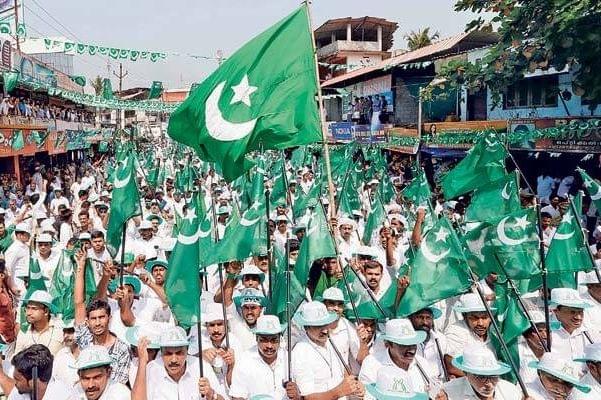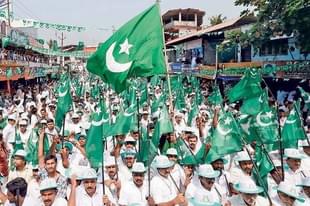Politics
Is The Muslim Vote Set To Desert The Congress In Kerala?
Venu Gopal Narayanan
Nov 26, 2023, 03:13 PM | Updated Nov 29, 2023, 02:07 PM IST
Save & read from anywhere!
Bookmark stories for easy access on any device or the Swarajya app.


A rather unique event with national ramifications took place in Kerala during the general elections of 2004. The Indian Union Muslim League (IUML) lost their bastion seat of Manjeri in Malappuram district to the Communist Party of India (Marxist), the CPI(M).
This unimaginable upset was caused by a rare flux in the Malabari Moplah community, who chose the ballot box to express their severe disgruntlement towards the Congress party, for not having been critical enough of the West during the second Gulf War of 2003. In the process, the Congress failed to win a single seat in the state, while the Communists registered their best performance ever in Lok Sabha elections (the Left parties won 59 seats, and their outside support was the keystone of a Congress-led government under Manmohan Singh).
As a result, a rattled Congress party was forced to do two things. First, it swiftly adopted rigid secularism as a principal credo, meaning that flagrant, full-blown, unapologetic minority appeasement became the leitmotif of everything the party said and did. The most brazen example of this shift was provided by Manmohan Singh, when he said that minorities, particularly Muslims, had to have the first right to India’s resources.
Second, the Congress had to co-opt into its midst, the core intellectual left which had hitherto lingered in the slightly less harmful orbits of academia and activism. That is how characters like Aruna Roy and Harsh Mander entered the highest echelons of policy making. Their path was membership in a National Advisory Council under Sonia Gandhi – effectively, a ‘super cabinet’ which ‘guided’ Manmohan Singh.
Something similar is a-stir in Kerala, and like in 2004, it has national ramifications.
One section of the Muslim community in Kerala believes that there is no point in continuing their long-standing alliance with the Congress party. They feel that their community would be better benefited by joining hands with the Marxists. Such sentiments have been fanned for well over a year now, through a persistent, assiduous wooing of the Muslim League by the Marxists – sometimes in the shadows, and sometimes quite openly.
Although the overtures have been rebuffed thus far, often through comical denials and counter-denials, the fact that a section of the Moplah community is actually considering this shift is music to the Marxists’ ears for a number of reasons.
First, this is not an outlandish proposition because the Marxists and the Muslim League have been allies in the past.
Second, bearing in mind that the Marxists command a major portion of the Christian vote in Kerala, after having smartly engineered a defection of Jose K Mani’s Christian party, the Kerala Congress, from the Congress’ coalition to the Left in mid-2020, any shift of even a portion of the Muslim League’s votes would make the Marxists fairly unbeatable in Kerala for some time to come.
Third, the Marxists would then acquire the coveted tag of ‘protector of the minorities’, first in Kerala, and then through amplification, to other provinces. Indeed, if the Muslim League, or even a portion of its vote, were to ally with the Marxists, it could potentially lead to a revival of Marxism at the national level.
Fourth, the Congress would, of course, be wiped out in Kerala by such a move.
This has national implications. As it is, the Congress is hard-pressed to win the 52 seats it did in 2019, because of the disaster it has created for itself in the Punjab. On top of that, and bearing in mind that the Congress won half of those seats from just three states (Kerala, Tamil Nadu and the Punjab), if it was to fare poorly in Kerala, then it is looking at little more than 30-odd seats in the Lok Sabha. That is a comedown which the party would not be able to weather.
Fifth, this flux, even if it comes to nought, gives the Marxists greater negotiating power with the Congress and its dotted coalition for seat-sharing talks.
The same benefit also accrues to the Muslim League, and already, there are murmurs in the press that they might push for a third seat; most probably Kasargod in North Malabar, a traditional Marxist bastion which the Congress surprisingly won in 2019.
Sixth, and perhaps most importantly, the possibility of a tie-up between the Muslim League and the Marxists puts Congress leader Rahul Gandhi in a bind. In 2019, he lost humiliatingly to Smriti Irani in Amethi, and saved his blushes only because he won from Wayanad in Kerala courtesy votes supplied by the Muslim League. Where does he stand today, in the midst of this flux, and can he take his win for granted in 2024?
No, he cannot, and that leaves him, and the Congress party, open to having the screws turned on them by the Marxists. Survival will mean more compromise, and being more beholden, particularly on matters of policy and political rhetoric.
But the Marxists are relentless, and to make matters worse, the incumbent Thangal Sahib of the Panakkad family (the hereditary spiritual preceptor of Malabari Moplahs, and the de facto head of the Muslim League), has, to put it as politely as possible, not yet shown that he is capable of managing the flux within his flock.
Instead, the Thangal Sahib had to sit helplessly by even as a sitting MLA of the IUML was appointed to the board of the Kerala Bank by the Pinarayi Vijayan government last week. Twisting the knife in, CPI(M) central committee member AK Balan publicly stated that the “IUML’s mind is with us and only the body is with the [Congress-led coalition]”.
This terrible embarrassment for the League was compounded a few days later, when one of its senior state council members blithely ignored the party’s instructions to keep a distance from the Marxists, and formally shared the dais with Pinarayi Vijayan at an official government event in Kasargod.
The Muslim League’s attempts at damage control only further worsened the myriad rifts within the party. First, they got an MLA to dissemble in such an inchoate manner that it only confused people more, and then, in a thoughtlessly counterproductive move, posters were put up in Malappuram district calling the MLA who joined the Kerala Bank’s board a ‘Judas’.
How any of this is going to heal the rifts within the League, or prevent a section of the Moplahs from shifting to the Marxists, is anyone’s guess.
We also cannot say for sure if the Bharatiya Janata Party will be able capitalize upon this disquiet, and replace the Congress as the principal opposition party in some parts of the state. But this much is clear: the Muslim community in Kerala increasingly believes that the Congress party is becoming increasingly incapable of promoting the community’s interests, not least because the Congress lacks the electoral draw to form a government in either Kerala or the centre. As a result, the Muslim vote becomes irrelevant, like it has in large states such as Gujarat or Uttar Pradesh, and they don’t like that.
And that is a sentiment which could very quickly spread to other states where the Congress still commands the loyalty of the Muslim vote. Still, the Congress mustn’t complain, because everyone knows that identity politics is a double-edged sword. Those who flourish by it are, in the end, felled by it as well.
Venu Gopal Narayanan is an independent upstream petroleum consultant who focuses on energy, geopolitics, current affairs and electoral arithmetic. He tweets at @ideorogue.




